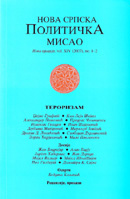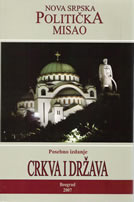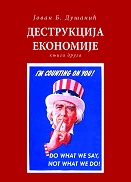| NSPM in English | |||
Don't Blame Russia |
 |
 |
 |
| петак, 02. април 2010. | |
|
(The National Interest, 1.4.2010)
Some in Western media appear almost gleeful that the March 29 metro attack occurred. It is as if Russia deserved to be punished for its domestic anti-terror policies initiated by former-President Vladimir Putin, and carried on by his successor Dmitri Medvedev. For the most part this criticism is unwarranted. There have been successes, missed opportunities, and poorly thought-out policies throughout Moscow’s anti-terror campaign. However, there is no reason to believe the actions of indigenous terrorist groups (with foreign assistance in some cases) will cause a rise of popular discontent against the current ruling political elite. The exact opposite is true—the average man on the street supports Putin and Medvedev’s words of uncompromising retribution against anti-Russian terrorists. If the objective of the terrorists was to mobilize public opinion against the authorities, then they failed in their mission during the planning stages of the attacks. Chechen rebels are now taking responsibility. But the Western mainstream media is pushing the line that they are “separatists,” and they argue further that the Chechens are in some way “freedom fighters.” The argument is that the Kremlin’s handpicked “strongman,” Ramzan Kadyrov, rules like a dictator (even at Moscow’s peril). The facts on the ground tell a very different story. I have been to Chechnya. Indeed, security is very tight. And the rule of law remains challenged. But, for the most part, there is peace in Chechnya. There is now a focus on building civil society and the economy. This is a far cry from the cruelties of two armed conflicts and governance by Chechen nationalist and religious extremists. Kadyrov is not another Thomas Jefferson, but then again the Chechen Republic is not Sweden. There’s no reason we should expect it to become so in the near future. The North Caucasus is a region which has experienced social and economic turbulence for centuries—and the area’s recent enthusiasm for Islamic fundamentalism has made things even more unstable. Unfortunately for Moscow, the relative success seen in Chechnya has been at the expense of the neighboring republics in the region. Dagestan, long a refuge of peace and stability—especially when compared Chechnya a few years back—is now a boiling caldron. Ingushetia, too, is experiencing severe societal pressures and a brutal cycle of violence. What Kadyrov expelled from Chechnya has found a fertile breeding ground elsewhere. Dagestan and Ingushetia are under siege. The lack of economic opportunities is obvious to anyone familiar with the Caucasus. This is an issue the Kremlin has acknowledged and which has prompted new, long-term approaches to the region. The days of Chechen independence fighters are in the past. And Dagestan and Ingushetia aren’t seeking independence from the Russian Federation. What both want (and Chechnya is slowly experiencing) is justice in every sense of the word. It is simply untrue that Russian federal security forces are wreaking havoc in the North Caucasus. It is far more complicated than that. Russian personnel are there to keep the peace, but have found themselves doing so in the face of warring elites and clans, while being deemed outsiders by the local population. Russia may not deserve any compliments for its treatment of the North Caucasus since the collapse of the Soviet Union, but it certainly does not deserve international condemnation. Though Western and Russian liberals like to endlessly talk about what is wrong with Russian policy in the region, they have very few concrete ideas to offer in response. Moral indignation is never enough when the facts on the ground are complicated and seemingly hopeless. Have mistakes been made? Yes. Have some of these errors made the situation worse? Yes, they have. But the presence of central authority is essential—and crucial to Russia’s territorial integrity. Then there is the issue of a foreign involvement in the Moscow attacks. Many in the West dismiss this prospect as a factor in the Kremlin’s low-intensity conflict in the North Caucasus, particularly if it includes Islamic fundamentalists from outside Russia. This is an error made out of obvious political expediency. There is undeniable evidence of foreign funding of terrorist and extremist groups in Russia. The West ignores such evidence at its peril. The Russian people have suffered still another terrorist attack. All of humanity should grieve with them. Peter Lavelle is the host of Russia Today’s (RT) CrossTalk discussion program. |
Од истог аутора
Остали чланци у рубрици
- Playing With Fire in Ukraine
- Kosovo as a res extra commercium and the alchemy of colonization
- The Balkans XX years after NATO aggression: the case of the Republic of Srpska – past, present and future
- Из архиве - Remarks Before the Foreign Affairs Committee of the European Parliament
- Dysfunction in the Balkans - Can the Post-Yugoslav Settlement Survive?
- Serbia’s latest would-be savior is a modernizer, a strongman - or both
- Why the Ukraine Crisis Is the West’s Fault
- The Ghosts of World War I Circle over Ukraine
- Nato's action plan in Ukraine is right out of Dr Strangelove
- Why Yanukovych Said No to Europe

.jpg)








 This week’s twin suicide bombings on Moscow’s busy metro system shocked all of Russia. Is this a return to the bad old days of the 1990s and early 2000s, which witnessed one terrorist attack after another? Has the Kremlin miscalculated in its own domestic “war on terror” against regional separatists?
This week’s twin suicide bombings on Moscow’s busy metro system shocked all of Russia. Is this a return to the bad old days of the 1990s and early 2000s, which witnessed one terrorist attack after another? Has the Kremlin miscalculated in its own domestic “war on terror” against regional separatists?













